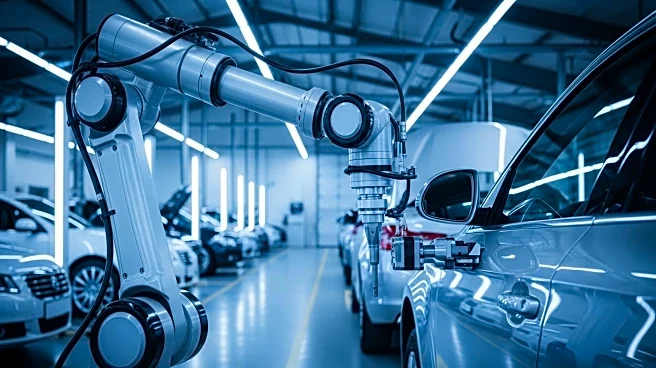What is the story about?
What's Happening?
Artificial intelligence (AI) is significantly transforming fleet maintenance by enabling predictive maintenance, which helps fleets forecast parts failures and optimize repairs. This technological advancement is crucial for fleets facing challenges such as natural disasters, supply chain disruptions, and fuel price volatility. AI-driven solutions are helping fleets manage costly maintenance challenges, including unplanned repairs, unexpected parts shortages, and recurring repairs due to quality and skill gaps. By utilizing real-time AI monitoring, fleets can reduce roadside breakdowns and improve truck uptime. Most new trucks are equipped with sensors that allow AI systems to monitor data and analytics in real-time, alerting maintenance teams to potential equipment failures before they occur.
Why It's Important?
The integration of AI in fleet maintenance is crucial for the trucking industry, which is constantly seeking ways to cut costs without compromising efficiency. By reducing maintenance costs and preventing costly roadside breakdowns, AI enhances fleet efficiency and productivity. This transformation not only helps in managing the three most costly maintenance challenges but also improves overall operational uptime. The ability to predict and address maintenance issues proactively can lead to significant cost savings and increased reliability, benefiting both fleet operators and their clients. As the industry continues to face external pressures such as regulatory changes and economic fluctuations, AI provides a strategic advantage in maintaining competitiveness.
What's Next?
As AI technology continues to evolve, its application in fleet maintenance is expected to expand further. Fleets may increasingly adopt AI-driven systems to enhance their predictive maintenance capabilities, leading to even greater cost savings and operational efficiencies. The trucking industry might also see a shift towards more advanced AI solutions that integrate with other aspects of fleet management, such as route optimization and driver performance monitoring. Stakeholders, including fleet operators and technology providers, will likely continue to collaborate to develop innovative solutions that address emerging challenges and opportunities in the industry.
Beyond the Headlines
The adoption of AI in fleet maintenance also raises considerations around data privacy and cybersecurity. As fleets rely more on real-time data monitoring, ensuring the security of this data becomes paramount. Additionally, the shift towards AI-driven maintenance may require workforce training and adaptation, as technicians and maintenance teams need to develop new skills to work with advanced technologies. The long-term impact of AI on employment within the industry could also be a topic of discussion, as automation may change the nature of certain jobs.
















